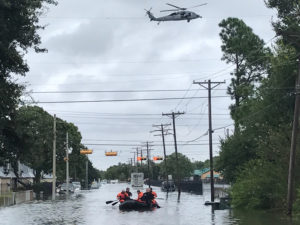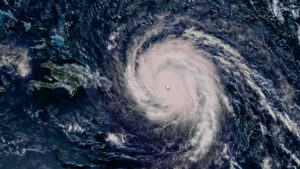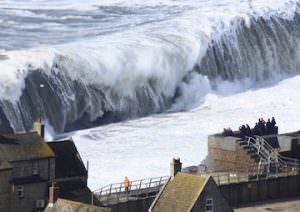Katrina ‘Could Soon Happen Every Other Year’
With temperatures predicted to rise by at least 2°C this century, storms like the one that drowned New Orleans in 2005 could occur in the Atlantic once every two years.
By Alex Kirby, Climate News NetworkThis piece first appeared at Climate News Network.
LONDON — Extreme storm events on the scale of Hurricane Katrina which caused widespread damage in the Gulf of Mexico in 2005 will occur far more often because of climate change, a new study says.
The research says the threat from extremely damaging hurricane-induced storm surges in the Atlantic will increase significantly as global temperatures rise.
Hurricanes are very sensitive to temperature changes, and the number of Katrina-magnitude storms may double because of the increase in global temperatures, the researchers report in the Proceedings of the National Academy of Sciences.
Storm surges are localised increases in sea level, brought about by extreme low pressure, which causes the sea to rise in a dome underneath. These surges sometimes run ashore at high tide and devastate local populations. With Hurricane Katrina, it was the surge that caused the widespread coastal flooding of New Orleans.
Dr Aslak Grinsted, lead author of the report, said: “It is always difficult to say what caused individual extreme weather events. Our analysis indicates however that we have passed a global warming threshold where we are having twice as frequent Katrina-magnitude surges.”
This study differs from earlier research into possible links between hurricanes and warmer sea surface temperatures by looking as well at the effect of warmer air.
Sharp rise predicted
One of the report’s co-authors, Dr Svetlana Jevrejeva, of the National Oceanography Centre in Liverpool, UK, said their approach was novel because previous studies had used climate models to forecast future hurricane frequency.
She said: “These findings have been controversial, and there is much disagreement among scientists regarding the relationship between hurricanes and temperature.
“In our study we used sea level data measured by various tide gauges throughout the twentieth century to see how extreme sea level during hurricanes has changed with temperature.”
The researchers then combined these historic data with projections of climate change, to predict how many Katrina-like storm surges would occur in the future:
“The results show that the extreme sea levels observed during Hurricane Katrina will become ten times more likely if average global temperatures increase by 2°C”, said Dr Jevrejeva. That would mean a storm surge of Katrina proportions every other year.
The UN’s Intergovernmental Panel on Climate Change predicts that global average temperatures could rise by somewhere between 2°C and 6°C by the end of this century. They have already risen by about 0.7°C since the start of the industrialised era two centuries ago.
Data queried
The researchers say the number of hurricanes as severe as Katrina could double, and possibly rise much more, with every 1°C rise in global temperatures.
The US National Oceanic and Atmospheric Administration says Hurricane Katrina caused an estimated $108 billion of damage, with last year’s superstorm Sandy thought to have cost $75 billion.
But the study has already attracted some criticism. USA Today quotes the climatologist Judith Curry of Georgia Institute Technology as saying the researchers used “a very incomplete data set”, using tide gauge measurements from only six US sites.
“I find this paper to be very misleading,” Professor Curry said. “Their statistical projection is totally unconvincing, since it is based on a data set that incompletely represents US landfalling hurricane activity since 1923.”
The study involved scientists from Liverpool, Beijing Normal University, the University of Copenhagen, the University of Lapland and Uppsala University, Sweden.
Your support matters…Independent journalism is under threat and overshadowed by heavily funded mainstream media.
You can help level the playing field. Become a member.
Your tax-deductible contribution keeps us digging beneath the headlines to give you thought-provoking, investigative reporting and analysis that unearths what's really happening- without compromise.
Give today to support our courageous, independent journalists.



You need to be a supporter to comment.
There are currently no responses to this article.
Be the first to respond.